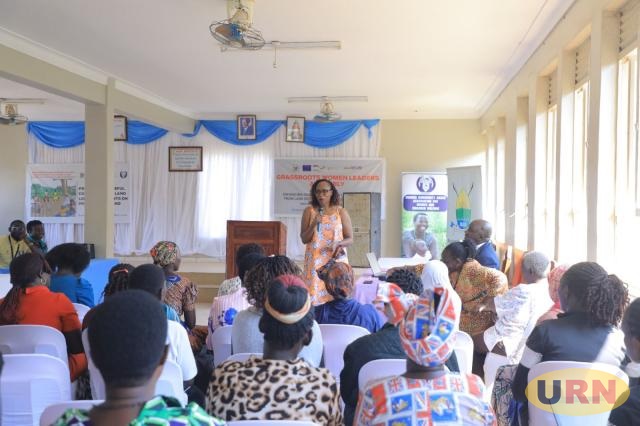
Kampala, Uganda | THE INDEPENDENT | Women in Kiboga have called for reforms in land laws and support for women in land registration and ownership. They say one of the challenges they face in the district and the country at large is limited land ownership.
They contend that women’s land rights are essential for various aspects of livelihoods including economic empowerment, food security and poverty reduction noting that secure land rights for them will enable them participate in formal trading, access higher income from emerging markets and have a say in household decision making.
The women made the revelations at the Kiboga district headquarters during a dialogue organized by Uganda Community Based Association for women and children welfare-UCOBAC in partnership with GIZ, a Germany agency, aimed at helping stakeholders and policy makers to put more emphasis on the importance of women rights to land and to set better strategies on women’s awareness on these rights, and to understand how land rights violations can be addressed at the grassroots level.
Caroline Musoke from Bukomero town council in Kiboga, states that, women possess the qualifications and abilities to handle various responsibilities traditionally assigned to men. However, she says, decision-making processes in Uganda still predominantly involve men, limiting women’s representation and influence.
Nalwango noted that more needs to be done to have full realisation of women’s land rights with strong measures by various stakeholders especially the government as the duty bearer and strengthening of the legal provisions within the government structures like the district and the Local council courts. She further states that, there is need for increased investment in programs aimed at reducing poverty, providing education, offering skill-building opportunities, and ensuring access to affordable land registration and ownership especially for the rural women in Uganda.
Agness Namusoke from Buzibwera cell in Kiboga town council, noted that more emphasis should be put on land offices like the district land office, local councils court to record and up-date all the information on land matters especially on women’ issues stating that this will enable the people to know how the trend of land transaction is taking place and to appreciate women’s land rights realization over time or learn how women are gaining or losing these rights.
Jesca Zalwango from Kambugu village in Nkandwa sub county says that, most women are ignorant about land rights and ownership in the district stating that there is need for stakeholders to come up and sensitize the women on their rights.
“As women we are still under fear of land insecurity and reluctant to talk about our rights to land and therefore stakeholders should come on board to sensitize women on their rights to registration and ownership.Our command on land use or ownership is limited or not recognized. This places most women in a difficult situation and in-security of their rights to land becomes a risk, yet the aspect of livelihood is very important in day-to-day life especially to the rural women, “she said.
Frances Birungi Odong, the Executive Director Uganda Community Based Association for women and children welfare- UCOBAC said that despite the existing global, regional and national commitments to gender equality in land rights, women in Uganda still face weaker land tenure rights compared to men stating that, only 16 percent of women in Uganda own land in their own right.
She says while Uganda has enacted progressive legal framework to address gender disparities in land governance, the implementation remains a challenge.
Odong says as UCOBAC, their stand for land campaign in the country aims to advance and secure equitable land rights for women by positioning grassroots women at the center to hold and exercise strong, gender-equal land related political efficacy and agency.
She says that presently, a majority of women in Uganda find themselves in the poorest brackets, making it imperative to address the issue of poverty as part of the United Nations Sustainable Development Goal (SDG) agenda.
According to Odong, most women are culturally marginalized when it comes to land ownership and they do not inherit land stating that the government, civil society organizations-CSOs, stakeholders, cultural and opinion leaders across the country should vigorously start advocating for the rights of ownership of land by women.
She further stated that land rights should clearly be considerate of gender from the local levels of societies and customs to the national, since women account for more than half of the total population in Uganda adding that failure to secure rights implies that women have a reduced ability and fewer incentives to participate in income-expanding economic activities which she says in turn worsens their situation in relation to securing a decent livelihood.
Odong noted that women awareness of their rights to access and own land is one crucial issue that the concerned stakeholders need to deal with jealously by enforcing their rights.
Odong says women have rights to own property as per the constitution of the government of Uganda and that these rights are addressed through the Land Act ( Cap 227) which recognizes women’s land rights and land acquisition Act (Cap 226) and that the land act of 1998 provides women with an opportunity to have secure access and control overland and be able to live with dignity in their respective societies.
Umaru Kalikwani, a land officer in the ministry of lands, housing and urban development stated that the government is aware of the challenges women face in accessing and owning land and that it is committed to addressing them given its commitment to respecting, promoting and protecting the human rights of women and according them full and equal dignity with men.
He says government has made considerable progress in designing and implementing measures to eliminate discrimination against women in the land sector noting that legal and policy frameworks have been undertaken to improve women’s access to and control over land and address gender inequalities prevalent in Ugandan society.
He says Uganda is a signatory to the United Nations Convention on Elimination against Discrimination of Women (CEDAW) protected under article 14 of CEDAW, where the government is required to report on the situation of rural women and how steps are being taken to address the prevalence of negative customs and traditional practices that prevent women from inheriting or acquiring ownership of land and other property.
He says by the mere fact that Uganda is a signatory to (CEDAW), respect and protection for women’s rights to land in terms of access and ownership is being taken into account through women leaders, advocacy and information sharing among women groups in various communities according to the human rights standards.
Uganda has got four types of land tenure system with the first being freehold tenure where one has full rights and registered ownership. The second is leasehold tenure, which refers to land leased for a specific period under certain terms while the third is known as Mailo land tenure, which involves holding registered land in perpetuity under a specific political authority such as a traditional leader.
The fourth type of land tenure, is customary, where land is regulated by customary rules often administered by clan or family leaders.
However, it can be noted that, in all these tenure systems, women tend to be excluded from owning land. They retain only secondary rights through males as wives, as daughters, sisters, or more distant relatives.
The Ugandan constitution of 1995 Article, 237 (1) states that, “Land in Uganda belongs to the citizens of Uganda and shall vest in them in accordance with the land tenure systems provided for in the constitution.
Article 26 goes on to say that, the Ugandan Constitution affirms protection from deprivation of property and land is part of that immovable property.
*****
URN
 The Independent Uganda: You get the Truth we Pay the Price
The Independent Uganda: You get the Truth we Pay the Price



